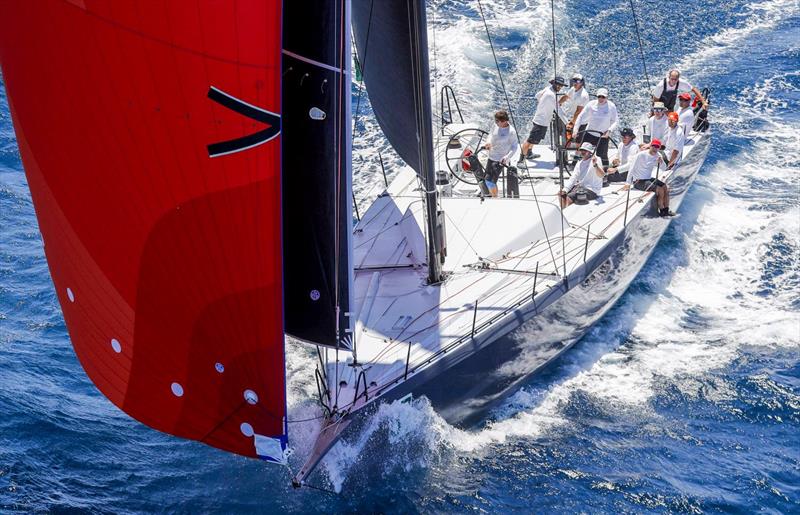
What is sailing?
by Mark Jardine 18 Nov 2020 08:00 AEDT

Start 2018 Rolex Sydney Hobart Yacht Race © Rolex / Studio Borlenghi
A simple question one would think, but there are several events, innovations, trends and decisions which have brought up this fundamental question for us sailors, particularly yachtsmen.
The question has arisen in discussions within the Sail-World.com and YachtsandYachting.com team in many a Skype, Whatsapp and Zoom conversation lately, mainly due to the Cruising Yacht Club of Australia's decision to exclude double-handers from being eligible to win the Tattersall's Cup, which is awarded to the open handicap winner in the Rolex Sydney Hobart Yacht Race. To understand their reasoning, we need to look at both technological development and trends in offshore sailing.
First up, let's look at the Vendée Globe. This race is gripping the world and has already led to a massive uplift in readership on our sailing websites, approaching a combined 500,000 unique users per month.
The 60-foot racing machines in which the solo skippers are sailing around the world are fitted with some of the most technologically advanced electronics in sailing, and the autopilots are one of the tools which the sailors rely on. We've mentioned before in our editorials just how advanced these systems are getting and how they can perform as well as, if not better, than a human helmsman. They don't get tired, they don't need sleep, needing only a diet of electricity and hydraulic oil, combined with data from an array of sensors, and they'll keep a foiling IMOCA yacht performing at close to its maximum through day and night.
Does this make the Vendée any less of a challenge? Does this make each skipper any less of a sailor? The overwhelming opinion is that the Vendée Globe is currently the pinnacle of ocean racing and the ultimate test of endurance in sailing. Managing an IMOCA yacht singlehanded is a Herculean task, and offshore sailing combines so many aspects: weather routing, boat maintenance, sail configurations, choosing when to push it and when to back off. This is offshore sailing at its very best, but the Vendée is certainly not a helming contest.
Electronics and mechanical aids have been available for years in sailing. Navigators have moved from paper charts, the shipping forecast, sextants and a good barometer to high resolution displays, GRIB files, GPS and routing software calculating multiple options, tied to the polars for a particular yacht, in the blink of an eye. Lay lines are updated in real time, taking tides and forecasts into account. The navigation revolution has happened and continues to be refined.
In dinghies and sports boats, small devices such as the Velocitek ProStart allow us to 'ping' each end of a start line, showing us instantly exactly how far we are from the line. Electronic compasses allow us to set up our tacking angles, showing us when we're on a lift or a header. Yes, some classes limit what electronics we can use, but in offshore sailing very little is restricted.
The latest autopilots may well be revolutionary in how they steer a yacht, but they are an evolution of a concept that has been around for over 100 years. Wind vanes were used to keep model yachts steering a straight line before the advent of radio control. Indeed, these are still in use in model yachting classes such as the Vane 36R.
Recent trends have seen the popularity of short-handed sailing take off. Having a mixed double-handed offshore event in the Paris 2024 Olympics has seen a slew of new designs hit the water from the major yacht manufacturers, which John Curnow, Sail-World.com's Australian Editor, has covered extensively in previous editorials. 2020, the year of social distancing, has accelerated the take-up.
In the UK, JOG racing has had a bumper year, with a record entry for the Lonely Tower Race in July. 86 of the entries were in the double-handed division with 68 starters and 59 finishers.
The French have led the way in shorthanded sailing with events such as La Solitaire du Figaro, the Mini Transat 6.50, the Transat Jacques Vabre, and of course the Vendée Globe itself, being established fixtures on their offshore racing calendar. Many of the offshore sailing stars in France are household names and sponsors flock to the big events, even in these times.
Which brings us back to the Rolex Sydney-Hobart and trying to understand the reasoning for excluding the double-handers from the Tattersall's Cup. The chances of a short-handed yacht winning the Sydney Hobart on corrected time is remote. History shows that larger yachts dominate this race and, with the number of transitions and manoeuvres needed, this comes as no surprise.
A top round-the-world racer recently stated, "If a double-hander wins on corrected, they should be given the Tattersall Cup for life!" and, in my opinion, they've got a valid point. Excluding double-handers from the top prize due to their use of autopilots seems unnecessary and belittles the many diverse roles which crew must perform in sailing.
There were 33 nominated double-handers for the 2020 Sydney Hobart, reducing to 22 by close of entry after we flagged the exclusion as likely back in August. The full decision was only made public by the CYCA after the close of entries, so it'll be interesting to see how many double-handed yachts take to the start line.
Returning to our fundamental question of what is sailing, I believe it is so much more than a helming contest. Crew work, navigation, seamanship and so many other factors come into our great sport, so growing sectors should be embraced and included, rather than side-lined into a separate category. The likelihood of a double-hander winning on corrected time is remote, but if they do then whoever wins the Tattersall's Cup will be left feeling slightly hollow about their victory, and that is a situation which should never be for this great trophy.
Mark Jardine
Sail-World.com and YachtsandYachting.com Managing Editor